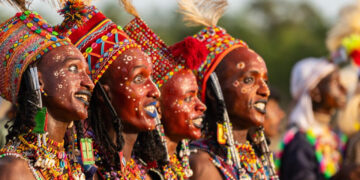How big is the Nigerian music industry? This question often arises when discussing Afrobeats’ economic contributions to the global stage. Over the years, the Nigerian music industry has evolved from a primarily local affair to a global phenomenon, driving cultural trends, economic growth, and international recognition.
From the infectious rhythms of Afrobeats to the chart-topping hits of Nigerian superstars, the industry has captured the world’s attention.
Beyond its cultural impact, the industry plays a vital role in Nigeria’s economy, contributing significantly to the nation’s GDP and creating jobs for thousands. With its unique blend of artistry and innovation, the Nigerian music scene has become a beacon for Africa’s creative potential.
How Big is the Nigerian Music Industry?
Let’s answer this question by explaining the following:
Economic contributions
The entertainment sector, encompassing music, film, and related activities, has become a significant contributor to Nigeria’s Gross Domestic Product (GDP). According to data from the National Bureau of Statistics, the industry grew by 27.46% over three years, increasing its value from ₦1.55 trillion in 2020 to ₦1.97 trillion in 2023. Notably, the music and film segments dominate this sector, accounting for 82.16% (₦1.62 trillion) of the total contributions.
Projections indicate that the Nigerian entertainment industry is on track to generate $14.82 billion in revenue in 2025, up from $4 billion in 2013. This anticipated growth represents a compound annual growth rate of 16.5%, underscoring the sector’s rapid expansion.
Global recognition and influence
Nigerian music, particularly the Afrobeats genre, has transcended borders, gaining immense popularity worldwide. In 2023, Afrobeats recorded 14 billion streams on Spotify, marking a 700% increase since 2017.
Artists like Burna Boy, Wizkid, Davido, and Rema have played pivotal roles in this global ascent. Burna Boy, for instance, became the first African artist to sell out a stadium show in the United States and has received ten Grammy nominations, the most for any Nigerian artist. Rema’s hit song “Calm Down” achieved over a billion streams, highlighting the international appeal of Nigerian music.
Industry Challenges
Despite its impressive growth, the Nigerian music industry faces several challenges. A significant portion of the revenue is generated abroad due to limited local market capacity, influenced by factors such as poverty, inadequate infrastructure, and currency instability.
Additionally, the industry grapples with issues like piracy, limited funding, and a lack of formal structures, which can hinder the full realization of its economic potential.
Future of the Nigerian Music Industry
The future of the Nigerian music industry appears promising, with several factors contributing to its continued growth:
- Digital innovation: The rise of streaming platforms like Spotify, Apple Music, and Boomplay has facilitated easier access to Nigerian music globally, opening new revenue streams for artists.
- International collaborations: Partnerships between Nigerian artists and international brands, such as Burna Boy’s involvement in Burberry’s 2022 Christmas campaign, have enhanced the global visibility of Nigerian music.
- Government initiatives: Programs like the Creative Industry Financing Initiatives (CIFI) aim to provide funding and infrastructure support to creatives, fostering a more conducive environment for growth.
Conclusion
The Nigerian music industry stands as a testament to the country’s rich cultural heritage and entrepreneurial spirit. Its rapid growth and global influence underscore its significance as a major economic and cultural force. While challenges remain, the industry’s trajectory suggests a future filled with opportunities for further expansion and international collaboration.





































Discussion about this post